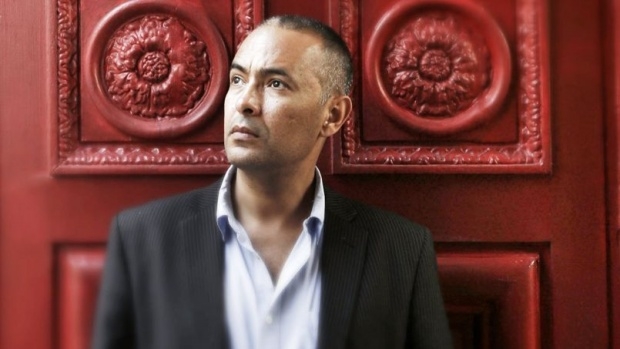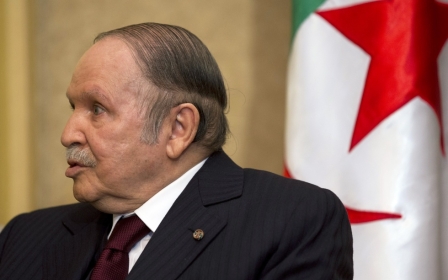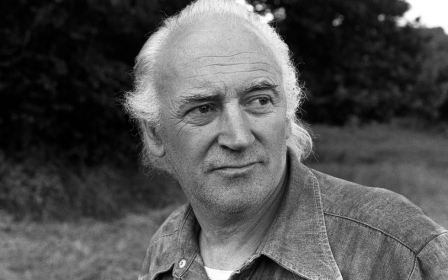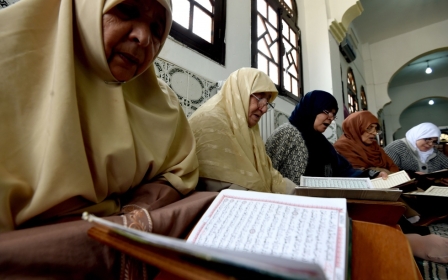EXCLUSIVE: Kamel Daoud, in Camus’ shadow
In an exclusive interview, Algerian writer Kamel Daoud discusses his latest book, an ambitious answer to Camus’ literary monument, The Stranger, and a reflection on the fractures within contemporary Algeria

Algerian writer Kamel Daoud has written an ambitious answer to Camus’ literary monument, The Stranger (Photo: Barzakh)
Published date: 14 April 2015 09:37 BST
|
Last update: 9 years 7 months ago
Camus and Algeria, Camus and independence: the scum of incomprehension is still floating to the surface of Algerian memory 54 years after the French-Algerian writer’s death. The talent of Kamel Daoud, 44-year-old Algerian journalist and writer, was thus necessary to avoid the sharp reefs of resentment while tackling the fundamental Camus novel, The Stranger. As Camus described coldly the senseless murder of a man only known as “the Arab”, in his book Meursault, Counter Investigation, Kamel Daoud takes the narrative point of view of “the Arab” senselessly killed by Meursault.
He gives this “Arab” a family and a name, Moussa Assasse. This counter investigation is also about the story of his brother, Haroun, who has become, despite himself, the guardian of the dead man’s memory. The last jolts of the war, the fleeing settlers, “the Absurdistan” that can already be predicted in the nascent power and the vengeance, this is the ultimate triumph of the absurd tragedy brought to life in Kamel Daoud’s clear, almost surgical writing.
The literary critics and the public are not mistaken: already the recipient of the François-Mauriac prize and of the Five Continents Prize, the book just missed winning the Renaudot price and the Goncourt. As if to make up for it, the illustrious Goncourt literary academy just announced that the book will be considered again for the 2015 first novel award. Even more, a theatre adaptation and a movie project are planned.
The Algerian War, memory at stake
The contested memory that remains between France and Algeria regarding the war of independence, long modestly called the “Algeria events”, did not negatively weigh on the reception of the book in France. On the contrary.
“I was expecting that the memory of colonisation would wake up, but I was pleasantly surprised. The French public has understood that this was an interrogation of the man and not of nationality. I don’t interrogate the past, but the present and the future,” Daoud told Middle East Eye.
But on the other side of the Mediterranean, the fear that the book would wake up a still fresh memory was proven. “The Camus affair” indeed never ceased to stir up the Algerian public, the reason perhaps being that the entire political and symbolic field of the country is dominated by the story of the national liberation. In that sense, Kamel Douad says: “I didn’t write a setting of accounts. To be honest, I was expecting strong reactions because Camus remains a sensitive topic. Some consider Camus as an exclusive property, others as a traitor to the Algerian cause. At each dedication, I saw the same trial as the one against Meursault in The Stranger, but this time Camus was the defendant. Each time, among the readers, a prosecutor would brandish Camus’ famous sentence about justice and his mother and his refusal of independent Algeria [editor’s note ”If that is justice, I prefer my mother”] whereas a defender would appeal to his work. It was fascinating…”
But the question remains to know why, in Algeria, only this famous sentence was remembered against Camus, and not, for example, his investigations denouncing, since 1939, the organised starving in Kabylia by the colonial state. For the author, Camus’ novel is above all deeply humanist: “This only sentence became a verse. I consider that we have the choice: take on this sentence and throw into the sea his 64 books or do the contrary. I made my decision and I have thrown away this sentence,” sighs Daoud.
More broadly, Daoud doesn’t hesitate to fiercely denounce the capture of the war of independence by the Algerian state (“le pouvoir”) as an indisputable political legitimisation. He explains to MEE: “There is less an Algerian history than an official hagiography. When I was a kid, I felt a kind of unease because I quickly understood that there were two Histories: the one from the propaganda and the one my parents use to tell me. They still had a clear memory of the colonisation period, of injustice, pain, but they didn't have this preoccupation for glory at all cost that I would find at school, so much so that it provoked my child mistrust. And we were told that History started in 1954, but then I understood that a lot of pages were missing.”
This overinvestment in the national legend, according to Douad, helps explain the murderous national psychosis into which Algeria was plunged in the 1990s. Daoud diagnoses his country in an almost psychological way, as a helpless witness to the bloody horrors of the civil war. “A jihadist in the desert kills the same way as Meursault did: one appeals to a verse, the other to boredom, but both are in the absurd. After independence, Algerians have kind of acquired Meursault’s psychology. They have the same unhealthy relationship with the real, as if they were living in a kind of boneless universe. Camus said: “One must be Algerian to understand the tragic,” and this tragedy was set alight during the civil war.”
An exposed journalist
A successful writer, Daoud is also an exposed journalist, in place at the Quotidien d’Oran, a francophone opinion newspaper. In his country, journalists and press caricaturists face difficulties confronting a highly litigious state that doesn’t hesitate to bring against them many exhausting complaints. But the politically savvy Algerian journalist has progressively developed a method to conserve a space of free expression.
In fact, Daoud almost makes fun of it, smiling while saying: “In order not to get into trouble, some ingredients are needed. First, a media visibility that relatively protects you. Above all, you have to be in complete good faith. My political opponents, the readers know that I don’t have any personal ambition and that my anger is sincere. But the problems don’t really come from the government but from the religious sphere. They are very virulent as soon as I tackle important affecting subjects Islam, Palestine, sexuality, women.”
If his articles are definitely deemed too virulent, Daoud doesn’t hesitate to spread them on social media. They find there a second life and thus touch an Algerian youth more and more connected, as well as a deep lack of political benchmarks.
However, Daoud is not fooled and he knows that his sudden fame abroad might be brandished by the authorities too as proof of the fullness of civil liberties in Algeria. How then to avoid being used as collateral by the state, I ask. The author simply replies: “The regime is using me? I use it too. I use this narrow area of freedom it gives me to construct meaning. That might not be much but I almost do a Pascal’s wager: it is possible that I won’t change anything, but I write as if I could change things.”
The Arab world into question
As a journalist, Daoud in July 2014 caused a stir after the publication in the midst of the Gaza bombings of an article titled: “Why I am not ‘united’ with Palestine?” Daoud visibly wants to explain this story that earned him, even among his friends, some incomprehension.
“Reactions were very sharp within the Islamists as much as within the seculars. Palestine remains the mirror of our frustrations in the Arab world. It is a symbolic question that reveals our powerlessness. However, my article was clear: I was refusing the automatic and selective ‘solidarity’. According to me, the question is about understanding why the Arab countries are failing to influence the situation,” the Algerian writer insists strongly.
This article intended to interrogate the incapacity of the Arab countries to sustainably reform themselves, Kamel Daoud says. “To have some weight on the international scene, you have to build strong countries where there is meaning and liberties. How can we achieve freedom for the Palestinians if that freedom isn’t respected at home? Let’s build freedom at home and then we will be able to export it. We cannot export what we do not have,” he analyses.
Even more, he denounced some Arab regimes’ cynical instrumentalisation of the Palestinian tragedy. Here, Daoud’s tone becomes passionate: “The Palestinian cause has been discredited because it has been too arabised and too Islamised. The rest of the world has thus left it to us, whereas it is a colonisation and international justice issue. In another article, 'How do we kill the Palestinian', I explain that when you cheat on the concrete quality of construction, for example, you kill the Palestinian because you weaken a country that could help him. When you prevent a woman from going to school, work, you kill the Palestinian. The murder of the Palestinian doesn’t necessarily start with Israel, it starts with us, with the abandonment of individual responsibility.”
Such counter-current analyses can only earn him hostility and threats. His critiques of religion are sometimes deemed even more unacceptable by some, as the writer has never hidden being tempted, in the late 80s, by political Islam, until the civil war diverted him. In December 2014, a death fatwa was issued on Facebook by an Algerian salafist imam, Abdelfateh Zaoui, chief of a banned party, the Front de la Shawa libre (Free Sahwa Front).
This fatwa followed his remarks that the Arab issue was entirely contained within the religious issue and that the Arab world had to solve it in order to finally move forward. A crime of lese-religiosity in the eyes of the salafist imam, but an analysis that spans the entire interview with Daoud, who describes himself, with a smile, as “totally obsessed with fundamental myths”.
New MEE newsletter: Jerusalem Dispatch
Sign up to get the latest insights and analysis on Israel-Palestine, alongside Turkey Unpacked and other MEE newsletters
Middle East Eye delivers independent and unrivalled coverage and analysis of the Middle East, North Africa and beyond. To learn more about republishing this content and the associated fees, please fill out this form. More about MEE can be found here.




